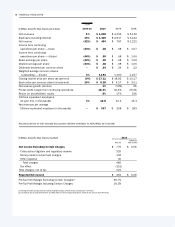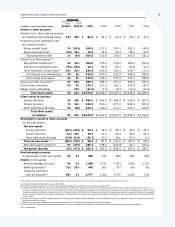Charles Schwab 2010 Annual Report Download - page 20
Download and view the complete annual report
Please find page 20 of the 2010 Charles Schwab annual report below. You can navigate through the pages in the report by either clicking on the pages listed below, or by using the keyword search tool below to find specific information within the annual report.
THE CHARLES SCHWAB CORPORATION
Through the Retirement Business Services unit, the Company and independent retirement plan providers work together to serve plan
sponsors, combining the consulting and administrative expertise of the administrator with the Company’s investment, technology,
trust, and custodial services. Retirement Business Services also offers the Schwab Personal Choice Retirement Account , a self-
directed brokerage offering for retirement plans.
The Company’s Corporate Brokerage Services unit provides specialty brokerage-related services to corporate clients through its
Stock Plan Services and Designated Brokerage Services businesses. Stock Plan Services offers equity compensation plan sponsors
full-service recordkeeping for stock plans: stock options, restricted stock, performance shares and stock appreciation rights.
Specialized services for executive transactions and reporting, grant acceptance tracking and other services are offered to employers to
meet the needs of administering the reporting and compliance aspects of an equity compensation plan. Designated Brokerage Services
provides solutions for compliance departments of regulated companies and firms with special requirements to monitor employee
personal trading. The Corporate Brokerage Services unit also provides mutual fund clearing services to banks, brokerage firms and
trust companies and offers Schwab-generated Investment Solutions outside the Company to institutional channels.
Regulation
CSC is a savings and loan holding company and Schwab Bank, CSC’s depository institution subsidiary, is a federal savings bank.
CSC and Schwab Bank are both currently subject to supervision and regulation by the Office of Thrift Supervision. However, the
Dodd-Frank Wall Street Reform and Consumer Protection Act legislation eliminates the Office of Thrift Supervision and transfers its
functions to other federal banking agencies effective July 21, 2011, unless extended or delayed for up to an additional six months. As
a result, the Federal Reserve will become CSC’s primary regulator and the Office of the Comptroller of the Currency will become the
primary regulator of Schwab Bank. As a savings and loan holding company, CSC is not subject to specific statutory capital
requirements. However, CSC is required to maintain capital that is sufficient to support the holding company and its subsidiaries’
business activities, and the risks inherent in those activities.
Schwab Bank is subject to regulation and supervision and to various requirements and restrictions under federal and state laws,
including regulatory capital guidelines. Among other things, these requirements govern transactions with CSC and its non-depository
institution subsidiaries, including loans and other extensions of credit, investments or asset purchases, dividends, and investments.
The federal banking agencies have broad powers to enforce these regulations, including the power to terminate deposit insurance,
impose substantial fines and other civil and criminal penalties, and appoint a conservator or receiver. Schwab Bank is required to
maintain minimum capital levels as specified in federal banking laws and regulations. Failure to meet the minimum levels will result
in certain mandatory, and possibly additional discretionary, actions by the regulators that, if undertaken, could have a direct material
effect on Schwab Bank.
The securities industry in the United States is subject to extensive regulation under both federal and state laws. Schwab is registered
as a broker-dealer with the United States Securities and Exchange Commission (SEC), the fifty states, and the District of Columbia
and Puerto Rico. Schwab and CSIM are registered as investment advisors with the SEC. Additionally, Schwab is regulated by the
Commodities Futures Trading Commission (CFTC) with respect to the futures and commodities trading activities it conducts as an
introducing broker.
Much of the regulation of broker-dealers has been delegated to self-regulatory organizations (SROs), which in Schwab’s case
includes the Financial Industry Regulatory Authority, Inc. (FINRA), the Municipal Securities Rulemaking Board (MSRB), NYSE
Arca, and the Chicago Board Options Exchange. The primary regulators of Schwab are FINRA and, for municipal securities, the
MSRB. The CFTC has designated the National Futures Association (NFA) as Schwab’s primary regulator for futures and
commodities trading activities. The Company’s business is also subject to oversight by regulatory bodies in other countries in which
the Company operates.
The principal purpose of regulating broker-dealers and investment advisors is the protection of clients and the securities markets. The
regulations to which broker-dealers and investment advisors are subject cover all aspects of the securities business, including, among
other things, sales and trading practices, publication of research, margin lending, uses and safekeeping of clients’ funds and securities,
capital adequacy, recordkeeping and reporting, fee arrangements, disclosure to clients, fiduciary duties owed to advisory clients, and
the conduct of directors, officers and employees.
-5 -
®
























